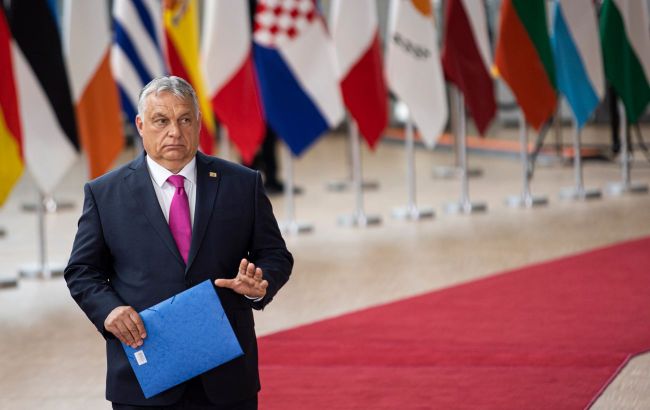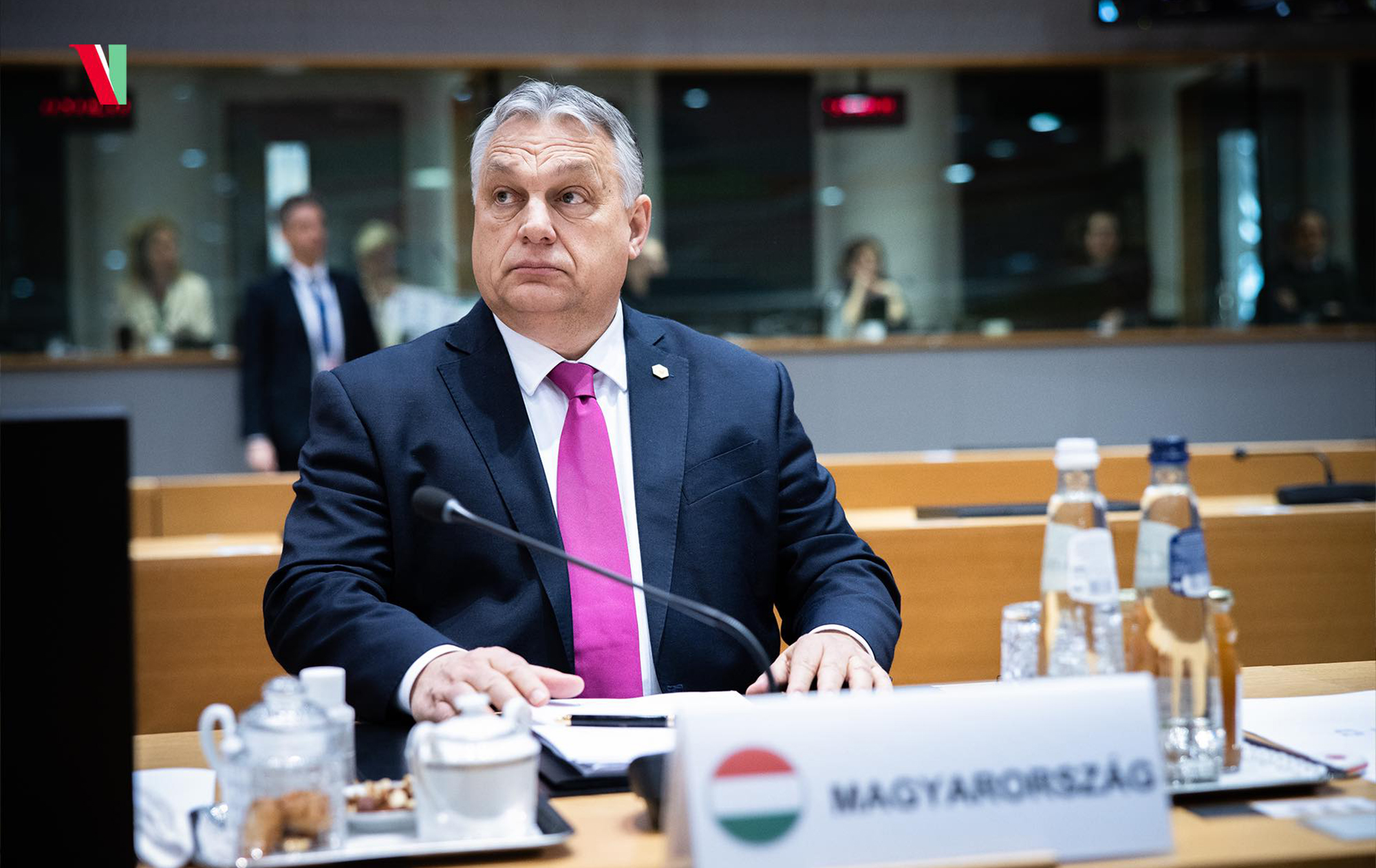Hungary's obstruction of Ukraine EU accession and Orban's objectives: Analysis
 Viktor Orban, Prime Minister of Hungary (photo: Getty Images)
Viktor Orban, Prime Minister of Hungary (photo: Getty Images)
Hungary threatens to block the start of negotiations on Ukraine's accession to the EU. What does this have to do with national minorities and how Kyiv and Brussels are looking for a compromise with Budapest - read below in the article by RBC-Ukraine.
The material was based on publications by the Financial Times, Bloomberg, Politico, and Radio Liberty, statements by Prime Minister Viktor Orban, Hungarian and Ukrainian officials, and exclusive comments by First Deputy Minister of Education and Science of Ukraine Yevhen Kudriavets and First Deputy Director of the New Europe Center Serhii Solodkyi.
The leaders of the European Union will gather for a summit in Brussels in mid-December to consider an important and, in fact, historic issue - the opening of negotiations on Ukraine's accession to the EU. The European Commission recommended starting negotiations with Ukraine in early November, but there is currently no consensus in the EU. The reason for this is Hungary's position.
Hungarian Prime Minister Viktor Orban is the only EU leader who openly opposes Ukraine's membership and threatens to block the start of negotiations at the December summit. In a recent interview with Hungarian radio Kossuth, Orban suggested postponing the Ukraine issue for 5-10 years and concluding a strategic partnership agreement between Kyiv and the EU during this time. The Hungarian prime minister proposed this idea allegedly because of the war in Ukraine.
"Ukraine is at war, so its legal system is different. We don't know how big its territory is, how many people it has because its residents are constantly fleeing," Orban explained at the time.
The other day, the Hungarian prime minister wrote a letter to European Council President Charles Michel, in which he called for the Ukrainian issue to be removed from the agenda of the EU summit. He explained this by saying that the summit would not be able to reach unanimity on Ukraine and discuss the issue in detail.
Orban's close ally, Hungarian Foreign Minister Peter Szijjarto, also spoke negatively about Ukraine's membership in the EU. After the European Commission decided to recommend accession talks, the Hungarian minister said that Ukraine would allegedly "bring war to the EU" and also claimed that the Ukrainian side had not fulfilled all the conditions for membership.
And recently, Szijjarto accused Kyiv of disrupting the talks with Budapest that were allegedly initiated by the Ukrainians themselves on the eve of the EU summit. Deputy Prime Minister for European Integration Olha Stefanishyna and the head of the Presidential Office Andriy Yermak allegedly offered to talk to him. But both conversations, according to Szijjarto, were canceled.
The issue of the national minority
Although the Hungarian authorities in their statements almost every time come up with some new reasons why Ukraine should not be allowed to join the EU, Budapest's main claims are not even about the war, but about the national minority issue. Because of disagreements on this issue, Hungary has been creating obstacles on Ukraine's path not only to the EU but also to NATO.
The "black cat" between Ukraine and Hungary was already in 2017 when the Ukrainian government approved a new law on education. The legislation in that version caused a flurry of criticism in Budapest because it affected the Hungarian minority in Zakarpattia. Against the backdrop of Ukraine's movement towards the EU, this issue has become relevant again.
 Hungarian authorities do not support the start of negotiations with Ukraine (photo: facebook.com/orbanviktor)
Hungarian authorities do not support the start of negotiations with Ukraine (photo: facebook.com/orbanviktor)
Recently, Orban, in his usual manner, criticized the Ukrainian education law, saying that the situation with the rights of national minorities in Ukraine "was better" during the Soviet Union. The cornerstone of dissatisfaction in Budapest was the beginning of studying subjects in Ukrainian during the transition from primary to secondary school for children who entered before 2018 and studied in minority languages under the old programs.
"They faced problems such as studying physics in Romanian until grade 9, and from grade 10 onwards in Ukrainian - and this is terminology, a difficult transition for students, which complicated the educational process. That's why Ukraine decided to postpone this transition for these children," Yevhen Kudriavets, First Deputy Minister of Education and Science of Ukraine, told RBC-Ukraine.
However, according to Kudriavets, the Hungarian side's demands regarding minority education are not detailed and specific, as they are driven by political factors, including Ukraine's position on EU accession. Initially, Budapest demanded the abolition of the new education legislation, which was a rather manipulative demand, the deputy minister added.
"Today, a return to the old legislation would mean rolling back the transformation of education that has been carried out since 2018. Therefore, to resolve this issue, Ukraine and Hungary resumed negotiations within the intergovernmental group in September of this year and developed a roadmap that is now being implemented by the Ukrainian side.
"We have a roadmap formed as a result of the agreements, to which Hungary is now making proposals. The solution to the complexity of implementing the rules for children who started school after 2018 and are already studying under the new programs is a new government bill," Kudryavets explained.
This refers to Bill No. 10288, which the Cabinet of Ministers submitted to the parliament in late November. Among other things, it provides for amendments to the law on education concerning national minorities. In particular, national minorities will be able to receive secondary education in their native language if it is an official EU language. However, the teaching of such subjects as the Ukrainian language, Ukrainian literature, History of Ukraine, and Defense of Ukraine will be exclusively in Ukrainian. In addition, schools will be able to independently expand the list of Ukrainian-language subjects at the request of parents or students.
 Ukraine and Hungary are trying to resolve the issue of minority education (photo: Vitalii Nosach, RBC-Ukraine)
Ukraine and Hungary are trying to resolve the issue of minority education (photo: Vitalii Nosach, RBC-Ukraine)
This bill is not a requirement of Budapest, although it contains changes that should satisfy the Hungarian side. These changes were proposed by the government at the request of the European Union as part of Ukraine's "homework" on the path to European integration and one of the steps towards accession negotiations.
"We will continue all negotiations with Hungary and fulfill the recommendations and requirements of the EU. We should consider the issue of education of children of representatives of national communities as a process of European integration, not as a requirement of Hungary. If the new bill is passed, Hungary will have fewer arguments," Kudriavets said.
While Hungary has not commented on the new Ukrainian bill, it has been met with criticism in Ukraine. In particular, the language ombudsman Taras Kremen stated that the proposed changes would "significantly worsen the functioning of the Ukrainian language" and submitted comments to the parliament.
But, according to Kudryavets, work on the draft law is still ongoing. "We have problems with how this law should work, so we need to spell out these mechanisms more clearly," he summarized.
Self-interest
The situation with the Hungarian minority is not the only issue that affects the position of official Budapest towards Ukraine. The Hungarian authorities also have their interests. For example, Budapest has repeatedly used the issue of Ukraine to address its needs: whether it is easing European sanctions against Russia, which affect industries important to Hungary, or unblocking European funding frozen due to Orban's domestic policy.
In May of this year, the National Agency on Corruption Prevention (NACP) added Hungary's OTP Bank to Ukraine's list of war sponsors, as the financial institution continues to operate in Russia. In response, Budapest blocked the allocation of 500 million euros from the EU military fund to Kyiv. In September, the NACP temporarily removed OTP Bank from the list, but Hungary called the decision "an insignificant change."
 Orban uses the issue of Ukraine to achieve his own goals (Photo: Getty Images)
Orban uses the issue of Ukraine to achieve his own goals (Photo: Getty Images)
Blackmail by blocking negotiations on Ukraine's accession to the EU may also be an attempt by Hungary to unblock European funding. Since decisions in Brussels are made by consensus, European leaders will have to convince Orban not to obstruct Ukraine's path to the EU, which means that concessions on their part are possible. For example, French President Emmanuel Macron has already invited Orban to Paris to discuss Ukraine.
In addition, in early October, the Financial Times, citing three European officials, reported on the EU's plans to unfreeze €13 billion that had been blocked since December 2022 due to problems with the rule of law in Hungary. At the end of November, according to Bloomberg, the EU was already working on allocating the first billion euros.
Will Orban block negotiations with Ukraine and how to get around it
This is not the first time Hungary has blocked European decisions on Ukraine. As a rule, the EU eventually agrees and finds ways to convince Hungary. But, according to Serhiy Solodkyy, First Deputy Director of the New Europe Center, Hungary's current policy is aimed at destroying the joint efforts of the vast majority of EU countries.
"This policy is extremely harmful to the EU. Of course, it also harms Ukraine, but above all, it harms the EU itself, which is now trying to strengthen its role in establishing stability in international relations. Hungary is doing everything possible to undermine these efforts of the European Union," he said in an interview with RBC-Ukraine.
 EU leaders still have time to convince Orban to support the decision on Ukraine (photo: Getty Images)
EU leaders still have time to convince Orban to support the decision on Ukraine (photo: Getty Images)
As the December summit approaches, the EU has begun to look for options in case it fails to convince Orban and blocks the start of negotiations with Ukraine. As Politico wrote, Brussels has a "nuclear option" on the table - to exclude Hungary from EU political decisions. Theoretically, Brussels could invoke a special procedure used when an EU member state is deemed to be at risk of violating the bloc's core values.
This extreme measure is considered to be very toxic in Brussels, as it will break the unity that has been so hard to build all along in the European Union. In addition, it could fuel the negative attitude of the Hungarian people toward the EU, which would again hit the unity of the bloc.
However, it is likely that the EU will not have to resort to the "nuclear option" or, worse, refuse to start negotiations with Ukraine. According to Solodkyi, in the past, the EU has had the legal savvy and ingenuity to reach a consensus. This, he said, makes him optimistic that the EU will be able to find an optimal solution that will suit all stakeholders. In addition, the blockade is not beneficial for Hungary itself, the expert believes.
"What will Hungary achieve by blocking? First, it discredits the entire EU. Secondly, if Hungary blocks the negotiations, Ukraine may not implement any changes regarding the national minorities that Budapest demands. In other words, Hungary will only make things worse. Therefore, let's hope that Budapest will realize that their decision will harm not only their allies and Ukraine but also themselves," explained Solodkyi.
An opinion that blocking Ukraine's European integration is not really in Budapest's interests was also expressed by an RBC-Ukraine diplomatic source. According to him, today Hungary is using Ukraine's accession to the EU to achieve its own "tactical goals," but strategically, Ukraine's membership is in the interests of Budapest itself.
There is still a week left before the summit in Brussels, which could be truly historic for Ukraine and the EU itself, so the EU still has time to find a consensus. At the same time, according to media reports, ambassadors of EU member states have already begun discussing the communiqué of EU leaders with the decision to start negotiations with Ukraine. This is a positive signal for Ukrainians, but the final version of the document may still change.

